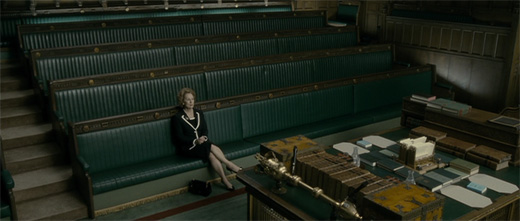
Written by Abi Morgan
Directed by Phyllida Lloyd
UK/France, 2011
Very early on in The Iron Lady, Margaret Thatcher’s father, in a flashback sequence, tells her to “never run with the crowd” and to go her own way. These words are typical of the “inspirational” biopic formula, and Phyllida Lloyd’s film embodies the style of that ilk of films, and most of their failings, in a presentation ill-fitting of its subject matter. Regardless of one’s political or personal views regarding Thatcher, there is a wealth of interesting material to be explored through a filmic representation of her life and career, either overtly positively or negatively, or in a balanced way that carefully considers the equal disdain and admiration she produces in people. The Iron Lady does not provide so much of a balanced view, more a completely middling, safe one.
The film is frustratingly and banally apolitical, offering no exploration of the views that fuelled her decisions in government nor the long-casting after-effects her administration has had. Key events and divisive issues (the union issues, the tax cuts, the IRA, etc.) are addressed via fleeting, offensively thin montages that just serve to summarise rather than scrutinise. Through neither taking a stance of idolisation towards Thatcher nor attacking her, The Iron Lady delivers no sense of her impact as a political figure. It is a toothless representation of someone known for their bite.
The only viewpoint that the film seems to commit to regarding Thatcher’s career is the bizarrely conceived choice to focus on her as some sort of feminist icon, repeatedly trumping the notion that she “will never be one of them”. Its few passionate concerns are entirely based around mythologising that single attribute, and a curious lingering on the portrayal of the elderly Thatcher as a hallucinating shell, unable to let go of the past and obsessed with her late husband. A further means of deviating from content that should articulate what inspires strong feelings regarding the former leader, this framing device is ill-conceived and, frequently, painfully executed; in light of her still being alive and suffering from dementia, the stylistic choice is also prone to constantly initiating thoughts of its uncomfortable nature and arguable tastelessness.
Meryl Streep’s performance extends beyond mere imitation, inhabiting the role to a strong degree, but it is only superficially impressive due to the film’s gaunt material that her delivery is dependent on. A bare, ugly film lacking in worthwhile thought or compelling delivery, The Iron Lady is an embodiment of the worst kind of biopic.
Josh Slater-Williams


